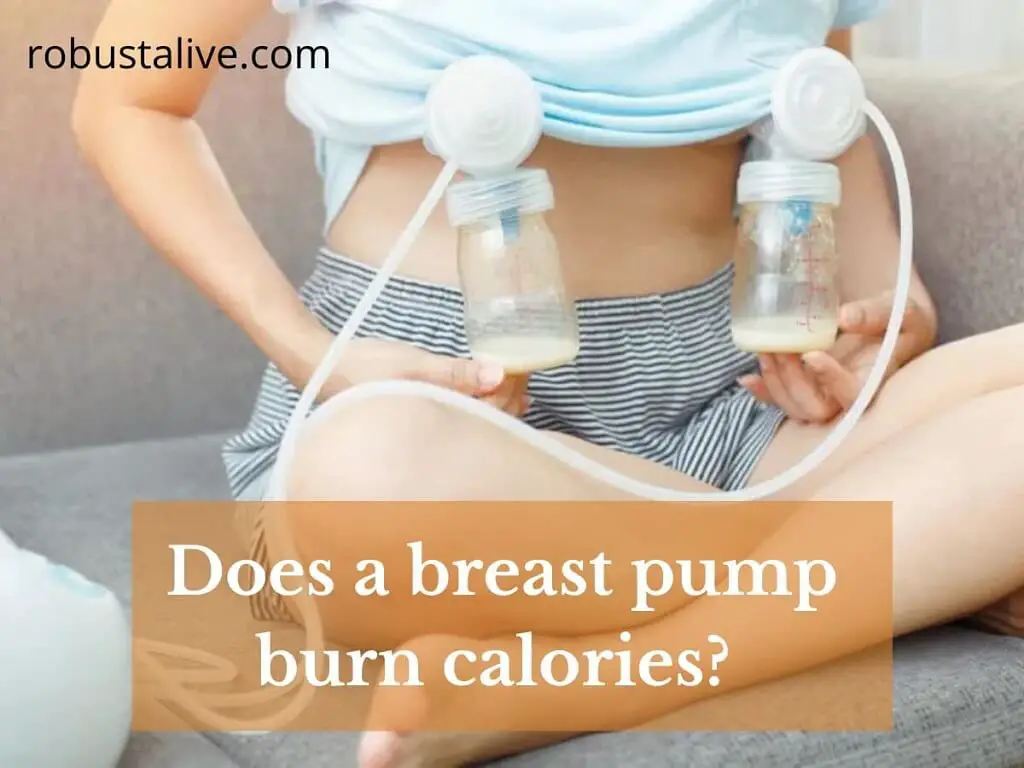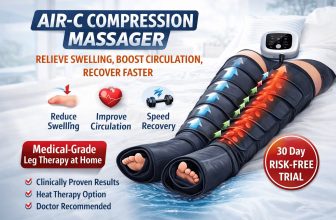Does a Breast Pump Burn Calories?

Does pumping burn as many calories as breastfeeding? Pregnant women ask it a common question by the end of the third trimester. Many nursing mothers have been observed utilizing breast pumps to burn as many as 500 calories daily.
Therefore, which is better for weight loss: breastfeeding or pumping? When people (typically women) learn you are expecting, they advise you to breastfeed the child. It is advantageous for both the mother and the child. We will discuss both pumping and breastfeeding to reduce weight in this article. Find out which is more efficient. “In this article, you can learn”Does a breast pump burn calories?
Breastfeeding

Photo Credit: robustalive.com
An infant receives the best nourishment from breast milk. The mother’s milk provides the newborn with the necessary nutrition in the first six months. It contains a blend of proteins, vitamins, and fat that is good for the baby’s growth. A newborn can readily assimilate breast milk as well.
Additionally, it contains antibodies that aid the infant in fending against bacteria and viruses. Babies who breastfeed have a lower risk of developing asthma and allergies. The mother and child’s attachment is strengthened during breastfeeding by physical proximity, skin-to-skin contact, and eye contact.
Infants that are breastfed develop to the proper weight without getting fat. Additionally, breastfeeding lowers the prevalence of Sudden Infant Death Syndrome (SIDS).
How Breastfeeding Burns Calories? (and other health benefits)
Breastfeeding has a very substantial correlation with weight loss. Your body will assist you in developing a “weight reserve” for you and your unborn child while pregnant.
Your body gets rid of that extra after giving birth through various methods, including breastfeeding. Let’s speak about how breastfeeding or pumping impacts our bodies now that we better understand breastfeeding as a whole.
Depending on body weight, adults typically need between 1600 and 2400 calories per day to maintain their health. You will unavoidably lose weight because your child is using some of your calories (and if you aren’t eating enough, make up for this).
According to the American College of Obstetricians and Gynecologists, a breastfeeding mother can burn up to 500 calories every day! The physical toll breastfeeding has on your body may be another factor in weight loss. I’ll go into more detail about how breastfeeding and pumping both have physical consequences on your body below.
Benefits of Breastfeeding
By burning extra calories, breastfeeding aids mothers in shedding pregnancy pounds more quickly. It usually causes the production of the oxytocin hormone, which aids in reducing the uterus to its pre-pregnancy size. It aids in lowering childbirth uterine hemorrhage. Studies have shown that breastfeeding reduces the incidence of osteoporosis and breast and ovarian cancer.
Advantages of Pumping
A mother may pump breast milk for a variety of reasons. Look at these advantages of pumping:
• Breast engorgement in new mothers can be relieved by pumping.
• The mother will be able to return to work and continue to breastfeed her breast.
• The mother will feed the child, as will her spouse or another caregiver.
• A mother can increase her milk production by pumping even before the baby demands more, which also helps to preserve the extra for later.
• By pumping, mothers can provide their extra milk to other mothers who are unable to breastfeed their children but still wish to provide their offspring with the health benefits of breast milk.
Side effects of Pumping
Breast pumps enable mothers to provide breast milk for their infants even when absent. But new mothers should know that utilizing pumps has risks and drawbacks.
• It may lower milk production: Constantly pumping breast milk lowers production. Because a breast pump’s mechanism differs significantly from a baby’s, latching on to a mother’s nipple and sucking causes the mother to produce more milk. A baby’s ability to latch on will eventually lessen if this is not allowed.
• When breast milk is directly fed to a baby with all the nutrients it needs. Vital nutrients in breast milk are lost when breast milk is stored, frozen, thawed, and then heated.
• Nipple and breast tissue damage: Using a misplaced pump or set up incorrectly might cause aching pain while pumping. Additionally, manual pumps hurt the mother’s hands and breasts.
• Baby becomes confused when fed by both breast and bottle because of the different suckling mechanisms. As when being bottle-fed with a rubber nipple, if the infant does not latch well during breastfeeding, it may suck harder on the mother’s nipple and create a sore nipple.
• Excessive milk letdown and painful engorgement: electric breast pumps pump excessive milk and store an enormous amount for later. It starts the body’s overproduction of hormones. It causes the breast to expand and become more milk-filled. For a nursing mother, it hurts more.
• Bonding: A robust emotional connection formed during breastfeeding between the mother and child. Bottle feeding cannot be used as a replacement.
• Repeated cycle of washing and sterilizing bottles: One drawback of breast pumps is the requirement for meticulous pre- and post-use cleaning and sterilization of all parts. If all the pump components are not thoroughly clean, the bacteria and fungi find the nutrient-rich breast milk the perfect environment to flourish and reproduce. Consequently, breast milk contamination might make a baby unwell.
• Tooth decay: Long-term exposure to milk in a bottle damages a baby’s developing teeth. The baby’s nipple is located behind its teeth when being nursed. When a baby is bottle-fed, he or she can doze off while holding the bottle in his or her mouth.
• Delays the mother’s postpartum recovery: the hormone oxytocin is released while breastfeeding. It lessens the amount of postpartum bleeding that the body releases. The uterus being contracted to its natural size in six weeks also aids. However, if the mother does not breastfeed her child, it may take 10 weeks or longer.
How Many Calories Are required for breastfeeding?
Each person’s calorie requirements vary depending on their needs. Therefore, there is no set minimum for calories. A very active woman needs more calories than a woman who works sedentary hours. To determine the precise amount of calories required, it is best to speak with a doctor. To your pre-pregnancy diet, however, you need generally add 300–500 extra calories.
How Many Calories Do Pumping and Breastfeeding Burn?
To provide enough calories for herself and the baby when nursing, a mother needs to add 300–500 calories to her diet. There seems to be a large variety of calories. So the crucial query is whether it is possible to lose weight or burn calories when pumping or breastfeeding. We need to investigate how differently breastfeeding and exclusively pumping affect the number of calories burned.
Exclusive Breastfeeding
A lactating woman may not know how much she is burning when exclusively breastfeeding. She may not receive the precise figure, but she will at least know how much she is burning. She can weigh her child before and after feedings to monitor how much milk she is making. She can then calculate how much weight she is losing due to breastfeeding. The range is between 300 and 850 calories. Yes, there is a significant difference, but there are many other things.
Exclusive Pumping
A breastfeeding mother can measure how much milk she produces when exclusively pumping to calculate the calories produced properly. If she cannot breastfeed but still wants breast milk to be a part of her parenting plan, she can also choose to pump exclusively. While alone pumping, she can shed some of the pregnancy weight. Pumping mothers can burn an extra 500 calories each day.
Tips to Lose Weight While Breastfeeding:
There is no assurance that nursing will help you lose the extra weight. Here are some tips to help you lose weight.
- Start working out.
- Must consume nutritious food
- Sleep and rest sufficiently.
- Begin slowly
End words by the writer
In the first six weeks of lactation, a woman shouldn’t be concerned about her weight. A balanced diet and proper sleep were advised for her throughout this period. The body needs extra calories to recuperate from childbirth and produce a steady supply of breast milk for the infant.
After recovering from childbirth, consider lowering weight, but start slowly. Consult a doctor before beginning a weight-loss program. Remember that it took nine months to put on the extra weight, so give yourself time to attain your weight loss goals. Weight loss goals can still be met long after breastfeeding finishes.
Frequently Asked Questions (FAQs) about Does a Breast Pump Burn Calories?
How many calories are burned during breast milk pumping?
The number of calories burned while pumping milk equals those while nursing. Between 200 and 600 calories are expended each day by pumping milk. It will differ from mother to mother, pumping session to pumping session, and the number of pumping sessions each day.
Is pumping more exhausting than breastfeeding?
Yes, because there are additional steps to take, exclusively pumping can be more taxing on mothers than exclusively breastfeeding.
Does pumping speed up weight loss?
Because you are creating far more milk than your baby would typically consume, you are burning MORE calories than you would if you were nursing.
References
https://rockthebabybump.com/breastfeeding-pumping-calories/
The CRAZY Number Of Calories You Burn Pumping & Breastfeeding
https://www.healthline.com/health/parenting/exclusive-pumping#benefits
https://www.womenshealth.gov/breastfeeding/pumping-and-storing-breastmilk
https://kidshealth.org/en/parents/breastfeed-pump.html
https://www.uptodate.com/contents/pumping-breast-milk-beyond-the-basics
https://aeroflowbreastpumps.com/beginners-guide-breastfeeding-pumping





